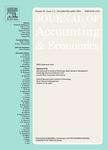-
作者:Core, J; Guay, W
作者单位:University of Pennsylvania
摘要:We predict and find that firms use annual grants of options and restricted stock to CEOs to manage the optimal level of equity incentives. We model optimal equity incentive levels for CEOs, and use the residuals from this model to measure deviations between CEOs' holdings of equity incentives and optimal levels. We find that grants of new incentives from options and restricted stock are negatively related to these deviations. Overall, our evidence suggests that firms set optimal equity incenti...
-
作者:Ke, B; Petroni, K; Safieddine, A
作者单位:Michigan State University; Michigan State University's Broad College of Business; Pennsylvania Commonwealth System of Higher Education (PCSHE); Pennsylvania State University; Pennsylvania State University - University Park
摘要:We investigate the relation between CEO compensation and accounting performance measures as a function of ownership structure. We use publicly-held property-liability insurers to consider the relation for firms with diffusely-held ownership and use privately-held property-liability insurers to consider the relation for firms with closely-held ownership. We find a significant positive association between return on assets and the level of compensation for publicly-held insurers. Consistent with ...
-
作者:Lee, CWJ; Liu, CW; Wang, TC
作者单位:Tulane University; Yuan Ze University; National Taiwan University; Hong Kong University of Science & Technology
摘要:This paper adapts Dye's (1995) model to evaluate the effects of the 150-hour rule on the audit market. Incorporating the auditors' education as a joint input with the audit effort for determining the audit quality, we show that the audit fee is higher, pre-rule CPAs are better off, and audit clients are worse off as results of the Rule. Additionally, more pre-rule CPAs elect to enter the audit market. Some less wealthy post-rule CPAs who would otherwise get into the audit market choose not to....
-
作者:Hayes, RM; Schaefer, S
作者单位:Northwestern University
摘要:We identify manager/firm separations where managers quit for a new job and study abnormal returns associated with these events. Applying analyses from labor economics, we argue that the average ability of managers who resign for a similar position at another firm should be higher than that of managers who die suddenly. Controlling for age and tenure, we find that firms losing managers to other firms experience an average abnormal return of -1.51%; compared to +3.82% for firms whose managers di...

